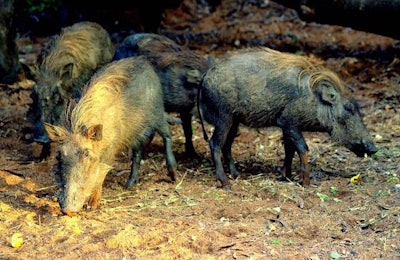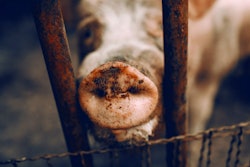
While there have been no new cases of African swine fever reported in Europe’s domestic pigs over the past week, the disease continues to afflict wild boar.
Up to February 3, there have been 98 confirmed outbreaks of African swine fever (ASF) among domestic pigs in Europe since the start of 2020, according to the European Commission (EC). The total has risen by 13 since the previous week. From this source, worst affected has been Romania (91 outbreaks). Bulgaria has reported six outbreaks, and there was one in Ukraine.
Over the past week, no European states have officially reported new ASF outbreaks in domestic pigs to the World Organisation for Animal Health (OIE).
More ASF in European wild boar
Based on OIE reports, there have been new cases of the disease among the wild boar populations in four countries.
Worst affected was Hungary. The agriculture ministry has reported 171 new outbreaks in wild boar to the OIE. These animals were found in the period January 21-28 across several regions. Of the total, 130 infected wild boar were detected in Borsod-Abauj-Zemplen. In the northeast of Hungary, this region shares a border with Slovakia, although no cases appear to have been found near to the frontier over this period.
Serbia’s agriculture ministry has reported a further 17 wild boar infected with ASF to the OIE. These were detected in the eastern districts of Bor and Pirot, where other cases have occurred since early January.
Also registering new ASF cases in wild boar with the OIE over the past week were Latvia (six animals), and Russia (four). The Russian cases were found in the Republic of Kalmykia, which is in the Southern federal district.
This year, there have been 1,165 confirmed outbreaks of ASF among European wild boar up to February 3, according to the EC. This represents an increase of 172 over a period of one week.
Poland reported the most outbreaks (428) to the EC, followed by Hungary (365), Romania (161), Bulgaria (71), Latvia (45) and Lithuania (38). Belgium, Estonia, Italy, Serbia, Slovakia and Ukraine have each reported fewer than 20 cases so far this year. EC figures do not include Moldova or Russia.
Greece raises ASF preparedness
Because its northern neighbor — Bulgaria — reported cases of ASF in regions close to the international border, Greece has increased surveillance for the disease.
According to the U.K.’s Department for Environment, Food and Rural Affairs (Defra), this has included sampling of wild boar and domestic pigs found dead or sick. There has also been active surveillance of hunted animals nationwide, as well as of backyard and commercial pig herds in the border area.
In its analysis of ASF cases in wild boar, Defra highlights a general upward trend in monthly detections of new cases in Europe since June 2019 (257 cases) to January (1,135 cases). Total over this period is 4,475 ASF-infected wild boar in 13 states (including Moldova and Russia).
ASF in other regions
Concerned at the “unprecedented threat” from the global spread of the disease, the United Nations’ Food and Agriculture Organization is to host an international conference on ASF in April.
After a period when the disease appeared to be confined to one region of each country, ASF has recently been confirmed for the first time on the Indonesian island of Bali, and on Mindanao in the Philippines.
View our continuing coverage of the global African swine fever situation.

















